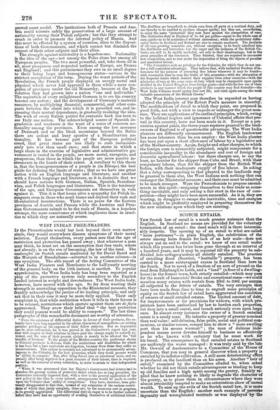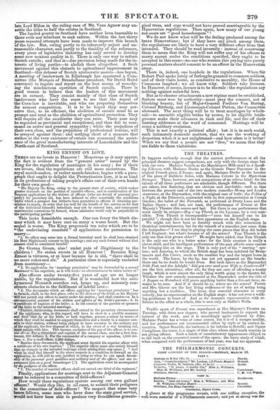SCOTCH ENTAILS.
Tam Scotch law of entail is a much greater nuisance than the English. In Scotland no means are provided for the voluntary termination of an entail : the dead man's will is there intermin- ably despotic. The opening up of an entail to what are called "heirs portioners "—in plain English, the subdivision of the estate among heirs female for lack of an heir male—does not always Tnit an end to the entail : we know of one entail under which this process has twice been gone through at an interval of a hundred years, and it may be repeated till the property be sub- divided into cottage-gardens all strictly entailed. The practice of entailing fixed (Scottice, "heritable ") property, has been carried to a more extravagant excess in Scotland than here in the South. Not to speak of a fraction of an acre of ground on the road from Edinburgh to Leith, and a "land" (a floor of a dwelling- house) in the former town, both strictly entailed—which may paw for the result of humorists' freaks and exceptional cases—we could mention many estates with rentals from 2001. to 5001. per annum all subjected to the fetters of entails. The very attempts that have been made from time to time to engraft some principles of equity on the Scotch law of entail have aggravated the condition of owners of small entailed estates. The limited amount of debt, for improvements or for provisions for widows, with which rt. prietors have been authorized by law to burden such properties, eat deep into a small rental, and trench seriously even upon large ones. In almost every instance the owner of a Scotch entailed estate is a needy man. He inherits a property of greater nominal than real value : self-delusion, false pride, social and political con- nexions, or similar causes, compel him to show a "more swelling port than his means warrant" ; the man of dubious inde- pendent means never devotes himself to business so effectively as he who knows with certainty that he must work for his bread. The consequence is, that entailed estates in Scotland are uniformly the worst managed : it was truly said by the late Mr. Oswald of Auchencruive to a Committee of the House Of Commons, that you may in general discover when a property is entailed by its inferior cultivation. A still more deteriorating effect is produced on the landlord than on his acres. Another "heir of entail," examined by the Committee alluded to, when asked whether he did not think entails advantageous as tending to keep up old families and a high spirit among the gentry, frankly re- plied that he knew nothing so likely to degrade the character Of the gentry, as to place them in circumstances where they were almost irresistibly tempted to make an ostentatious show of unreal wealth. To sum up the evils of the Scotch entail law, it is more uncertain than the English : another such example of perverse ingenuity and wrongheaded rectitude as was displayed -by 'the
late Lord Eldon in the ruling case of Mr. Vans Agnew may un- settle the titles to half the estates in Scotland.
The landed gentry in Scotland have neither been-insensible to -those evils nor reluctant to seek reform. Within the last thirty years repeated attempts have been made to improve this branch of the law. But, owing partly to its inherently unjust and un- reasonable character, and partly to the timidity of the reformers, every piece of legislative tinkering has only served to develop some new noxious quality in it. There is only one way to reform -Scotch entails ; and that is—due provision being made for the in- terests of living parties—to abolish them altogether. A fresh movement against this obstacle to agricultural improvement in Scotland—this debaser of Scotch aristocratic morals—has begun. A meeting of landowners in Edinburgh has appointed a Com- mittee (the Marquis of Breadalbane president, Sir David Baird convener) to inquire and report on the best means of remedy- ing the mischievous operation of Scotch entails. There is good reason to believe that the leaders of this movement are in earnest. They consist mainly of that class of Scotch leztdowners who have the sense to see that the repeal of the-Corn-law is inevitable, and who are preparing themselves • ..for earnest competition. It is to be hoped they may per- -eeive that, to be efficient, the abolition of entails must be as -prompt and total as the abolition of agricultural protection. They will require all the auxiliaries they can raise. Their case may be regarded as provincial and exceptional, and thus fail to corn- an active and general sympathy ; while the prejudices of their own class, and the prejudices of professional routine, will be arrayed against them : and nothing short of a measure that strikes at the very existence of entails can command the assist- ance of the great manufacturing interests of Lanarkshire and the ,,North-east of Scotland.



























 Previous page
Previous page